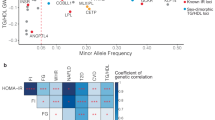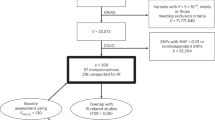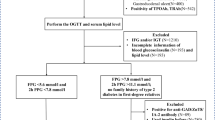Abstract
Increased oxidative stress has been observed to contribute the development of insulin resistance. Oxidative stress is known to increase the conversion of deoxyguanosine (dG) to 8-hydroxy-2′-deoxyguanosine (8-OHdG). Human 8-oxoguanine glycosylase (hOGG1) is the key component responsible for the removal of 8-OHdG from oxidatively damaged DNA. The repair activity of the hOGG1 Ser326Cys gene variant has been demonstrated to be lower than that of the hOGG1 Ser/Ser genotype. Therefore, the possible association of the hOGG1 Ser326Cys gene variant with insulin sensitivity was investigated in 279 normal glucose-tolerant subjects without history of cancer. Allele frequency was 21.5% for the Ser/Ser genotype (n=60), 45.9% for the Ser/Cys genotype (n=128), and 32.6% for the Cys/Cys genotype (n=91). Subjects carrying the Cys/Cys genotype had significantly lower insulin sensitivity levels, assessed by homeostasis model assessment-insulin resistance (HOMA-IR), compared with the Ser/Ser and Ser/Cys genotypes (P<0.001 and P<0.001, respectively). In a multiple linear regression analysis, the Cys/Cys genotype was a significant determinant of HOMA-IR, independent of age, sex, body mass index, fasting plasma cholesterol, triglyceride, HDL cholesterol, LDL cholesterol, or hypertension. The present study indicates that the hOGG1 gene Cys/Cys variant is associated with a significant decrease in insulin sensitivity in subjects with normal glucose tolerance.
Similar content being viewed by others
Log in or create a free account to read this content
Gain free access to this article, as well as selected content from this journal and more on nature.com
or
References
Barbieri M, Bonafe M, Marfella R, Ragno E, Giugliano D, Franceschi C, Paolisso G (2002) LL-paraoxonase genotype is associated with a more severe degree of homeostasis model assessment IR in healthy subjects. J Clin Endocrinol Metab 87:222–225
Breen AP, Murphy JA (1995) Reactions of oxyl radicals with DNA. Free Radic Biol Med 18:1033–1077
Bruce CR, Carey AL, Hawley JA, Febbraio MA (2003) Intramuscular heat shock protein 72 and heme oxygenase-1 mRNA are reduced in patients with type 2 diabetes: evidence that insulin resistance is associated with a disturbed antioxidant defense mechanism. Diabetes 52:2338–2345
Bruner SD, Norman DP, Verdine GL (2000) Structural basis for recognition and repair of the endogenous mutagen 8-oxoguanine in DNA. Nature 403:859–866
Ceriello A, Quagliaro L, Piconi L, Assaloni RDRR, Maier A, Esposito K,Giugliano D (2004) Effect of postprandial hypertriglyceridemia and hyperglycemia on circulating adhesion molecules and oxidative stress generation and the possible role of simvastatin treatment. Diabetes 53:701–710
Deakin S, Leviev I, Nicaud V, Brulhart Meynet MC, Tiret L, James RW (2002) Paraoxonase-1 L55M polymorphism is associated with an abnormal oral glucose tolerance test and differentiates high risk coronary disease families. J Clin Endocrinol Metab 87:1268–1273
Evans JL, Goldfine ID, Maddux BA, Grodsky GM (2003) Are oxidative stress-activated signaling pathways mediators of insulin resistance and beta-cell dysfunction? Diabetes 52:1–8
Grundy SM (1999) Hypertriglyceridemia, insulin resistance, and the metabolic syndrome. Am J Cardiol 83:25F–29F
Haffner SM, Miettinen H, Stern M (1997) The homeostasis model in the San Antonio Heart Study. Diabetes care 20:1087–1092
Kohno T, Shinmura K, Tosaka M, Tani M, Kim SR, Sugimura H, Nohmi T, Kasai H, Yokota J (1998) Genetic polymorphisms and alternative splicing of the hOGG1 gene that is involved in the repair of 8-hydroxyguanine in damaged DNA. Oncogene 16:3219–3225
Lee AJ, Hodges NJ, Chipman JK (2005) Interindividual variability in response to sodium dichromate-induced oxidative DNA damage: role of the Ser326Cys polymorphism in the DNA-repair protein of 8-oxo-7,8-dihydro-2′-deoxyguanosine DNA glycosylase 1. Cancer Epidemiol Biomarkers Prev 14:497–505
Leviev I, Kalix B, Brulhart MMC, James RW (2001) The paraoxonase PON1 promoter polymorphism C(−107)T is associated with increased serum glucose concentrations in non-diabetic patients. Diabetologia 44:1177–1183
Maddux BA, See W, Lawrence JCJ, Goldfine AL, Goldfine ID, Evans JL (2001) Protection against oxidative stress-induced insulin resistance in rat L6 muscle cells by micromolar concentrations of alpha-lipoic acid. Diabetes 50:404–410
Moller DE, Bjorbek C, Vidal-Puig A (1996) Candidate gene for insulin resistance. Diabetes Care 19:396–400
Norbury CJ, Hickson ID (2001) Cellular responses to DNA damage. Annu Rev Pharmacol Toxicol 41:367–401
Ogihara T, Asano T, Katagiri H, Sakoda H, Anai M, Shojima NOH, Fujishiro M, Kushiyama A, Fukushima Y, Kikuchi M, Noguchi N, Aburatani H, Gotoh Y, Komuro I, Fujita T (2004) Oxidative stress induces insulin resistance by activating the nuclear factor-kappa B pathway and disrupting normal subcellular distribution of phosphatidylinositol 3-kinase. Diabetologia 47:794–805
Paolisso G, Tagliamonte MR, Rizzo MR, Giugliano D (1999) Advancing age and insulin resistance: new facts about an ancient history. Eur J Clin Invest 29:758–769
Pleiner J, Schaller G, Mittermayer F, Bayerle-Eder M, Roden M, Wolzt M (2002) FFA-induced endothelial dysfunction can be corrected by vitamin C. J Clin Endocrinol Metab 87:2913–2917
Rudich A, Tirosh A, Potashnik R, Hemi R, Kanety H, Bashan N (1998) Prolonged oxidative stress impairs insulin-induced GLUT4 translocation in 3T3-L1 adipocytes. Diabetes 47:1562–1569
Rudich A, Tirosh A, Potashnik R, Khamaisi M, Bashan N (1999) Lipoic acid protects against oxidative stress induced impairment in insulin stimulation of protein kinase B and glucose transport in 3T3-L1 adipocytes. Diabetologia 42:949–957
Talior I, Yarkoni M, Bashan N, Eldar-Finkelman H (2003) Increased glucose uptake promotes oxidative stress and PKC-delta activation in adipocytes of obese insulin-resistant mice. Am J Physiol Endocrinol Metab 285:E295–E302
Tretter L, Adam-Vizi V (2000) Inhibition of Krebs cycle enzymes by hydrogen peroxide: a key role of [alpha]-ketoglutarate dehydrogenase in limiting NADH production under oxidative stress. J Neurosci 20:8972–8979
Acknowledgments
This study was supported in part by Grants DOC 93-HP-1101 from the Department of Health, Taiwan. We are grateful to Prof. Ming-Tsang Wu for his statistical advice and critical comments.
Author information
Authors and Affiliations
Corresponding author
Rights and permissions
About this article
Cite this article
Wang, CL., Hsieh, MC., Hsin, SC. et al. The hOGG1 Ser326Cys gene polymorphism is associated with decreased insulin sensitivity in subjects with normal glucose tolerance. J Hum Genet 51, 124–128 (2006). https://doi.org/10.1007/s10038-005-0335-8
Received:
Accepted:
Published:
Issue date:
DOI: https://doi.org/10.1007/s10038-005-0335-8
Keywords
This article is cited by
-
Association of hOGG1 genotype with life style and oxidative DNA damage among Chinese ethnic populations
Archives of Toxicology (2009)



